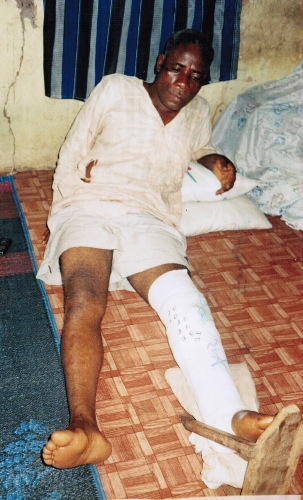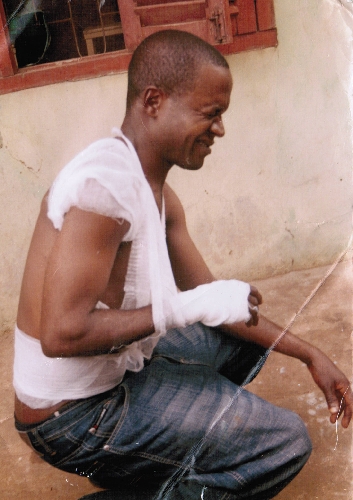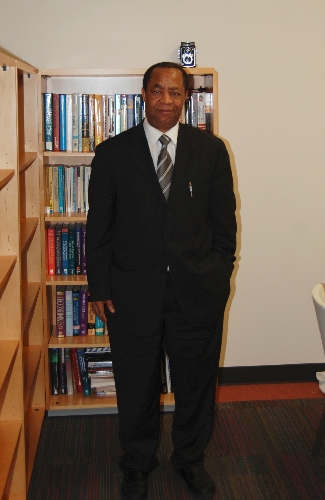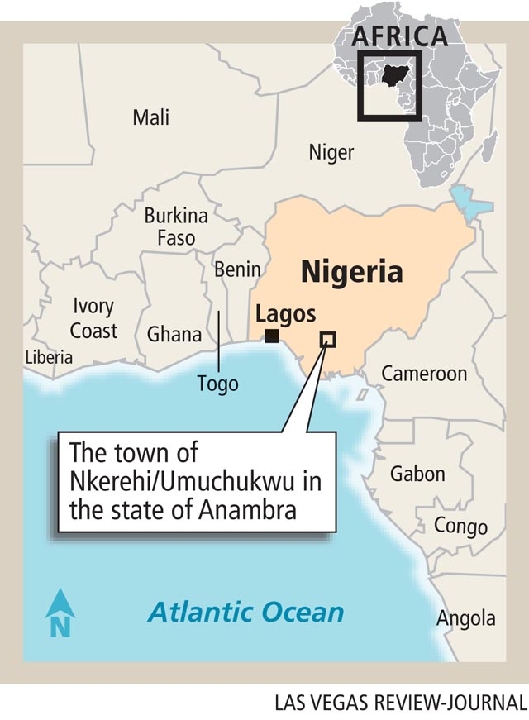Las Vegas doctor denies allegations he runs militia accused of slayings in Nigeria
One of eight children, Godwin Maduka came from a small village in Nigeria with thatched huts and no electricity or running water. The primary school was in a tiny church. Cars couldn't navigate its single lane dirt road.
It was common for the drinking water, contaminated with feces, to infect townspeople with debilitating worms. The poverty he experienced in Nkerehi is a far cry from the life of a millionaire that Dr. Godwin Maduka enjoys today in Las Vegas with his wife and five children.
He bought seven residential properties here for more than $7 million, according to Clark County records, and spent nearly $4 million on the two buildings that house the Las Vegas Pain Institute, where he employs 80 people.
"I am living the American dream," the 51-year-old naturalized citizen said at his Henderson branch office. "And I'm doing all I can through philanthropy to help the people where I came from live a better life. It is so small that most everybody there is either related by blood or marriage."
Nigerian newspapers have chronicled his philanthropic acts, including the building of houses, a school complex, town hall, church and residence for priests in his hometown. Vincent Ottaokpukpu, a lawyer in the town of 2,000 people, also credits Maduka with funding that has helped bring electricity, clean water, a hospital, the Internet, a police station and a paved road.
"Most people love and respect him here," the lawyer said in a phone call from Nigeria.
Maduka's brilliant mind earned him scholarships at U.S. colleges. He finished his bachelor's degree in chemistry at Rust College in Mississippi in less than two years, earned a doctorate in pharmacy at Mercer University in Georgia and a medical degree from the University of Tennessee. He finished his postgraduate training and residency in anesthesiology and pain management at Harvard Medical School and Beth Israel Hospital before setting up his practice in Nevada in the 1990s.
Against that backdrop of incredible success, hard work and compassion, however, there comes a disturbing view of Maduka, one driven unceasingly by Nigerians using the Internet to accuse him of being a violent man, a religious zealot who runs a militia to intimidate, maim and even kill Nigerians who don't agree with his idea of a Christian makeover for his hometown.
They say Maduka seized people's land without compensation to build a Catholic monastery, had vigilantes tear down sacred shrines and trees of traditional worship, and forced a name change on a town centuries old. In 2008 Nkerehi, which means "taking a cow by force" in the Igbo language, was christened Umuchukwu, or "children of God."
There are some Nigerians from Maduka's birthplace, including his cousin Richard Igwike, a professor of business at Dillard University in New Orleans, who believe his ego has gotten out of control, that in exchange for his philanthropy Maduka demands that people conform to his views or risk his wrath.
Maduka said at the root of their "empty complaints" is jealousy over the good things he's done.
Igwike said what is driving the complaints is Maduka's "brutal use of power."
Last year, on behalf of 139 Nigerians, including Igwike, New York attorney Okechukwu Nnebe filed a unique civil suit against Maduka in U.S. District Court in New York City, asking for unspecified monetary damages for violations of international and domestic law over the past four years that include "murder, arson, assault with deadly weapons, destruction of property and illegal arrests with detentions."
According to the federal lawsuit:
In early 2007, Maduka seized communal land belonging to poor farmers to build a monastery to "sanctify" the town by "desecrating historical hallowed objects of traditional worship."
Maduka "personally led a posse of thugs armed with dangerous weapons to attack those in Nkerehi ... that refused to submit to his dictates and several individuals were indiscriminately battered and tortured." The lawsuit alleges that the doctor enlisted his "Umuchukwu Vigilantes" through bribery and co-opted "the notoriously corrupt" Nigerian law enforcement to prevent their crimes from being prosecuted.
In August 2009, according to the lawsuit, Maduka threw a party for the vigilantes to announce his "final resolution" to the "Nkerehi issue," exiling and eliminating all opposition. By the end of August, the lawsuit alleges that vigilantes shot and killed two men, tortured more than 20 and looted, burned and vandalized the homes of more than 90 residents.
The lawsuit was filed under the Torture Victims Protection Act and the Alien Tort Claims Act. The Alien Tort Claims Act is a statute notable for allowing U.S. courts to hear human rights cases brought by foreign citizens for conduct outside the United States. The Torture Victims Protection Act allows for the filing of civil lawsuits in the United States against individuals who, acting in an official capacity for any foreign nation, committed torture or extra-judicial killing. The statute requires a plaintiff to show exhaustion of local remedies in the location of the crime, to the extent that such remedies are "adequate and available." Plaintiffs may be citizens or noncitizens.
In September 2009, Nigerian police, following what they called an exhaustive investigation of the violence in Umuchukwu, exonerated Maduka and his supporters of any criminal wrongdoing and said that petitioned complaints against him were "spurious, malicious and vindictive." The report said the violence was perpetrated by those who didn't want the town's name changed. Police investigator James Nwafor, who said in a long-distance phone call that he worked on the probe for police commissioner Ali Amodu, told the Review-Journal that authorities went to "great lengths to ensure that the investigation was honest and thorough."
According to police, investigations into two deaths in the community are still under way.
Nnebe argued in his lawsuit that his clients can't be afforded a legal remedy in Nigeria because the government and police are corrupt. Maduka, the lawsuit alleges, "was able to set up his own private army and carry out serious acts of violence, intimidation and murder against plaintiffs and others because he has been able to use funds he remits from the United States to bribe, co-opt and buy-off the notoriously corrupt inefficient agencies and organs of law enforcement in Nigeria."
"It is a shame," Nnebe told the Review-Journal, "that a doctor who is supposed to care for others would engage in such things."
In October, Maduka's Las Vegas attorney Cal Potter argued a motion for dismissal of the case before federal Judge Carol Bagley Amon in Brooklyn. So did New York attorney Janet Fashakin, who is representing two other Nigerian defendants. Both attorneys said the case should be heard in Nigerian courts, noting that lawsuits have been filed there but not yet adjudicated.
Potter told the judge that Maduka would be willing to go to court in Nigeria. If the U.S. case is not dismissed, Potter has filed a motion calling for it to be moved to Las Vegas.
The judge has yet to rule on the motion to dismiss.
The Nation, a respected Nigerian newspaper, has followed the turmoil in Nkerehi/Umuchukwu, which is in the Nigerian state of Anambra. In November 2009, it wrote an account of the violence under the headline, "Mayhem in Anambra community."
"This problem which has engendered misfortune in Nkerehi community in Orumba South Local Government Area, has reached an alarming proportion," the article states. "Brothers have resorted to killing and maiming brothers."
Many people had fled the town to live in surrounding communities, the newspaper account said.
The reason for the mayhem, reporter Nwanosike Onu wrote, "was the purported change of the community's name from Nkerehi to Umuchukwu ... the name change it was gathered was necessitated by the belief within a section of the community that the original name connotes fetishness, hence the resolve to call themselves Umuchukwu. But those who still believe in the community's tradition are stoutly resisting the change thus setting the stage for the seemingly inevitable clash."
According to the article, "the battle of supremacy ... is being led by two personalities in the community. They are Dr. Godwin Maduka, who is believed to be the proponent of the change of name and Prof. Richard Igwike who is against the change. ...
"The most puzzling part of the entire situation is that two of alleged sponsors of this communal crisis in the persons of Maduka and Igwike are said not to live at home."
Neither Maduka nor Igwike told the Review-Journal that they are heading the factions that have clashed. Both men say they are simply supporting the "will of the people."
Aaron Barnard-Luce, a spokesman for Amnesty International, said his human rights organization, which has regularly detailed abuses of the citizenry throughout Nigeria, did not have any evidence of orchestrated violence in Nkerehi/Umuchukwu "on its radar."
Hilary Renner, a spokeswoman for the U.S. State Department, said the government is not investigating wrongdoing in that area.
The State Department's 2009 human rights report on Nigeria does say that throughout the country "corruption was massive, widespread, and pervasive at all levels of government and throughout the security forces."
Potter is dismayed that his client's "good name" is being "hurt."
"All of this is sad," he said. "We have a fine man who is helping people in two countries. And because anyone can file a lawsuit, no matter how unsupported it is, his reputation can be hurt."
Don't tell Igwike, Innocent Onwu or Promise Onwu that there is no basis for the lawsuit.
After phone conversations with the Review-Journal, Innocent and Promise Onwu sent e-mails detailing allegations of attacks on them and their families by Maduka and his "militia."
Innocent Onwu, who still lives in Nigeria, wrote: "I have been attacked by Godwin Maduka's militia on 23rd August, 2009 as well as my father, my brothers, my uncle and my cousins. ... The list of the unprovoked violence and inhumanity meted on the members of my family and other people by Godwin Maduka, that devil and his militia is very long." His father, Pius, was hit in the head and died as a result of the attack, Innocent Onwu said, and his uncle, Ben, and cousin, Ekene, were beaten unconscious.
Promise Onwu, who now lives in Denmark, detailed the attacks in a lengthy e-mail: "Dr. Maduka personally beat my cousin Ekene Onwu who was in his mid-seventies for nothing. After, the Agureri boys who Dr. Maduka hired and equipped with dangerous weapons almost killed me, God be the glory who saved me as I narrowly escaped death. ... Dr. Maduka's armed men attacked my uncle, Ben Onwu, and broke his leg with a rod. ... They also attacked my cousin Godhelp Onwu."
Igwike, who once taught at Rust College in Mississippi where Maduka studied, said from New Orleans: "I don't know why, but about four years ago my cousin became power hungry, a religious terrorist. I had done all I could for him, even helped him get into college in the United States. He did good things for our community, but then he changed and became all wrapped up in religion. He wanted people to believe as he did but our community was tolerant of all religions."
In 2007, Igwike said Maduka personally beat two of his brothers and threw his 76-year-old father in jail, all because they wanted the town to show respect for its heritage. And he said that when his mother went to Maduka's compound in the town to beg for her son Basil's life, Maduka ordered his police escort to get her out of the area.
"They dragged the fragile old woman, bruising and skinning her weak knees, and in the process of dragging her out of Dr. Maduka's compound, her African rapper (wrap-around cloth) detached from the waist and she was dragged out virtually naked," Igwike said.
While he was in Africa, Igwike said, he "barely escaped being killed by Maduka's thugs."
Maduka calls the allegations "totally false" and said the men just want to discredit his good works in his home town.
"I would never hit anyone, and I would never pay anyone to do it. I am a good Christian man," he said.
He said he believes Igwike has orchestrated the campaign against him. Igwike "now wishes he had done more for his town and is trying to discredit what I have done. ... He is simply jealous about what I have done and he wishes he had done more."
He also said that Igwike's help in getting him into college basically amounted to getting him an application.
The Rev. Placid Guste, who lives at the Mary the Font Solitude Catholic monastery outside St. Louis, said Maduka did help him erect a monastery near the town in 2007.
"He donated 10 acres of land and got some others to do so as well," the priest said. "They did so willingly. ... And they got rid of relics they wanted to get rid of. Dr. Maduka had nothing to do with that."
He also said the name change came after a vote of the people.
"The people who didn't like the change didn't vote and only came out afterward to complain," he said.
The priest said Maduka had to travel around town with a police escort.
"If he didn't, he would be kidnapped and held for ransom," he said.
The police investigation that exonerated Maduka of any wrongdoing found that as far back as 2002, leaders in the community talked about changing the "backwardness of their community" and started a crusade "to pray for the progress of the community."
"During the crusade," according to the report, "the pastor warned about idol worshipping and that they should destroy idols/shrines associated with evil." The police investigation also said the pastor found the name Nkerehi "evil" and demanded that the name be changed."
Subsequent to the crusade, according to the police, the idols and shrines were destroyed and the town's name changed.
Referendums were held to ensure that "due process" was followed in changing the town's name in 2008, the police report states.
"The decision to change the name Nkerehi did not emanate from Dr. Godwin Maduka but from a crusade," the report states.
According to a recent town history provided by attorney Vincent Ottaokpukpu, the town's name emanates from events centuries ago that involve a hunter named Okpuama who would capture human beings whom he would use for ritual and sacrifices. Nkerehi, or "cows being taken by force," became the nickname Okpuama gave for the act of using human beings as sacrifices. People liked the name and named the area for it.
The name, Nkerehi, then, according to the history, symbolizes human beings who were used for ritual and "hence the clamor by the people to change the name to a better thing."
Another history, provided by Igwike, said the town is simply named after "a great child" who was named "Nkerehi" because "a cow was the reigning animal."
Igwike, and another college professor from Nigeria based in the United States, Patrick Ibe, both say the referendums to change the town's name were rigged, indicative of Maduka's ability to pay off government officials. The two men head a group called Nkerehi Town Union-USA. Both say they regularly stay in touch with townspeople and relatives there in "an effort to get justice for them."
Ibe, a professor of criminal justice at Albany State University in Georgia, told the Review-Journal that it is impossible to overestimate Maduka's monetary influence.
An open letter that he wrote with Igwike to the Nigerian Inspector general of police and Anambra state governor on January 5, 2010, shows the depth of their belief that their homeland is corrupt:
"It is ... unfortunate but not surprising that the government of Anambra State under Governor Peter Obi has not shown any fortitude to stop the unlawful activities of Dr. Godwin Maduka's militia and his youth thugs in Nkerehi ... Dr. Maduka is reported to have boasted that he is one of the chief financiers of Governor Peter Obi's second bid for governship race in Anambra State."
To Maduka, the idea that he uses his money to corrupt government and police officials is ridiculous.
"I could not do that with all those people," he said. "I am a good man. I gave money only to help people. There is no truth to these lies."
Surely, he said, if he could pay all the authorities off, "would my brother just have been arrested?"
On Wednesday, Maduka's brother Hyacinth was taken in for questioning by police in connection with the mayhem in Nkerehi/Umuchukwu. Under Nigerian law, if people sign a petition accusing someone of wrongdoing, he is brought in for questioning, Maduka said.
"That happened to me, too, and nothing was found against me," he said. "I worry about my brother, but at the same time, I know he did nothing wrong."
Maduka said he would have never won his country's United Action Against Corruption & Injustice International Annual Award for Incorruptible Icons in Africa in 2009 if he was "a bad guy."
"I only try to do the right things for all people," he said. "My patients will tell you that. We see nearly 100 a day."
It is easy to find patients in the Las Vegas Valley who sing the praises of Maduka.
Charlotte Hodges, a Clark County School District custodian who was in a car wreck that she said left her barely able to walk, calls Maduka "a godsend."
"I couldn't have stayed on the job without him," she said. "Shots, blocks, IV pushes, physical therapy -- he didn't just give me pills and walk away. He's been there for me. Now I can walk. He cares about his patients. I love him. We're lucky to have him in Las Vegas."
Review-Journal reporter Brian Haynes contributed to this report. Contact reporter Paul Harasim at pharasim@reviewjournal.com or 702-387-2908.


























